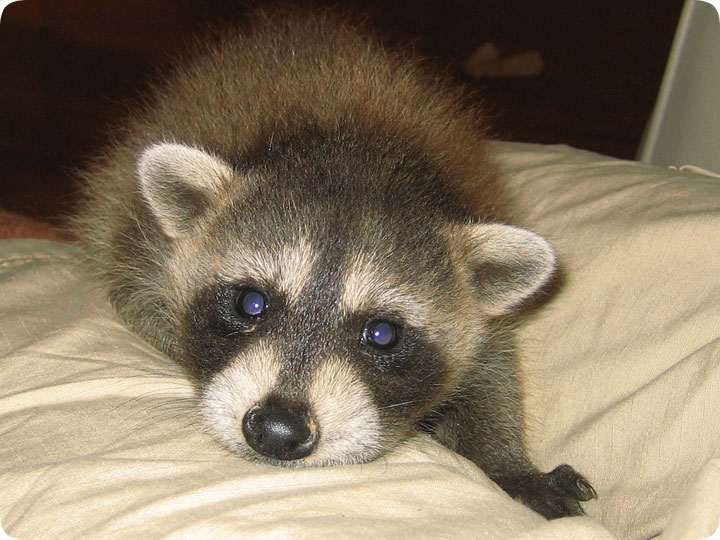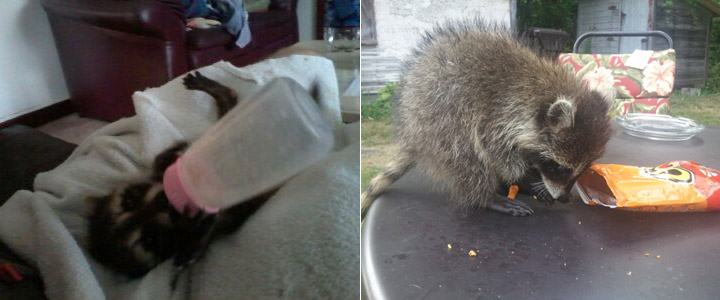-
info@aaanimalcontrol.com
Call us for help in your town
Humane Wildlife Education
Pet Raccoon

08.23.2004 - I probably get two or three requests per year for raccoon babies that people want to keep and raise as pets. I mean, just look at how cute they are!
How darling! Your grandaddy told you that he kept a raccoon as a pet, and it was great! Who can resist that black mask and that ringed tail and those cute little
hands? I do admit, I handle a lot of baby raccoons that I get out of attics, and they are just about the cutest animal alive - cuter than kittens or puppies, and they
make the most darling noises. Just look at it cuddling on my lap. Irresistible. Great then! Just the pet you're looking for.
Until it suddenly
and without warning bites your face off once it reaches 6 months old. Raccoons are wild animals. There's a reason they are not commonly made pets. Believe me,
if they could be domesticated, they would be, because they are very pretty and smart animals, and they have distinct personalities and a lot of fun traits. But they are
wild animals through and through. Once they hit sexual maturity at about six months of age, they are no longer gentle and cuddly. I've heard of many cases in which
people keep pet raccoons and suddenly find themselves under attack without warning one day. Yes, there are exceptions, and some raccoons are simply more aggressive than
others. But you should not take a chance with a raccoon as a pet.
And another thing: it's illegal in pretty much all states in the USA to keep a raccoon as a pet.
Usually only people who are certified and licensed as wildlife rehabilitators can keep raccoons in their home or on the premises.
Of the people who I've talked to who
have had raccoons as pets, I've heard various stories. Some have managed to do it successfully, some have been attacked unprovoked, and everyone agrees that this is the
messiest pet alive. Raccoons don't just eat their food or drink their water. They spread it all over the place. They climb, and they pry open cabinets and
take things apart. It may sound cute, but it means that if a raccoon is in your house, it will destroy a lot. They are best left in a large pen with lots of toys
and things to climb.
How do you obtain a pet raccoon? Many people want to know where to find a raccoon breeder. I've never known of one. That's why so
many people ask me for baby raccoon, because I get them all the time out of attics. But I always decline, and never give a raccoon to a person, not even for a high amount
of money, due to the above reasons. I always give baby raccoons to a wildlife rehabber who feeds and raises them in a proper environment and relocates them to the wild,
where they belong.

Above are some photos that a reader sent to me about her pet raccoon baby. Here's the email text that she wrote to me:
I read your site. I clean him well and am careful with his litterbox but he does sleep in my bed. Usually under the covers by my feet but occasionally on my pillow.
I've had him dewormed but cant find a vet for immunizations. He has adopted me and i him.
He's so funny sweet and naughty at the same time. Any resources you could provide would be helpful.
I've had him 2 months and he's about 2 1\2 to 3 months old. I've tried to introduce him to the outdoors but he likes the house. In fact if he gets scared he runs right for the door..lol... He has a cage that is left open for him and lots of toys to chew and climb.
I've thought a lot about his quality of life but he seems so happy here. I leave the door open but he follows me or sits by me. He
doesn't leave. We go for walks and he stays at my feet. I worry about his future and my health. Thank you for your time and ANY advice. Its too late for
don't do it... lol.. ;-)
I also got this email:
I reside in Michigan. I found an orphaned raccoon about 2 months ago.
He is approx 2 1\2 to 3 months old. He was bottle fed for almost 1 1\2
months with kitten replacement milk. I am very careful in caring for
him (he is bathed every other day which he LOVES) and I'm careful in
disposing of his waste. He is litterbox trained but does put his paws
on my face in my coffee or soda and does share my bed. I've had him
wormed but cant find a vet that will treat him with vaccines (rabies
and distemper). Any advice or resources you could provide would be
helpful. I love him and he has adopted me as his mum. I don't want to
lose him or become ill. He gets scared outside and has made his nest
in a kitchen drawer than i cleaned out for him and lined with self
paper. He's cute quirky and so enjoyable. He has such a great and funny
personality. I would love to let him live in the wild but he is a
mamas boy and I don't see his release as being successful. He is a great
companion and pet.
Do it yourself: Visit my How To Get Rid of Raccoons page for tips and advice.
Get professional help: Visit my Nationwide Pro Directory of wildlife removal experts.
The raccoon (Procyon lotor), is a unique animal native to North America. It's not closely related to any other animals, with distant relatives such as bears and weasels. Coons are easy to recognize, with a black mask and ringed tail. Raccoons tend to weigh between 10-20 pounds
as adults. They are mostly nocturnal, and are omnivores. Racoons average a lifespan of about 5 years in the wild, and have a litter of 3-6 young each spring. They are very strong, excellent climbers, very intelligent, and they are very skilled with their hands. Raccoons have learned to
thrive in urban areas, and live in very high densities in cities, where they eat garbage and pet food. They commonly break into homes and attics, where they cause considerable damage, and they also destroy other property, and thus racoons are considered pest animals by many people. Raccoon
control and removal, especially from inside homes, is best left to a professional.
For more wildlife stories, click my Wildlife Blog
or click my below banner to hire a local trapper.
Pet Raccoon - Do Raccoons Make Good Pets? What Are Some Risks of Having a Pet Raccoon?
Can raccoons be domesticated? Do they make good pets? There are a lot of questions surrounding the domestication of raccoons and whether they can or cannot be good pets. As interesting as the question may be, most people often don't consider whether they should or shouldn't take in raccoons as pets. There is a moral piece to the topic that is often not talked about.
As for the question of whether raccoons make good pets or not, the answer is simple– No. Raccoons are not pets. They are not pets in the sense of cats and dogs regardless of how many generations they may be bred in captivity. At best, raccoons can be considered temporary companions when they are little. The older they get the more of a liability they become. Raccoons do not like to live by rules, especially not from someone else. They live by their own rules and change them whenever it suits their needs. There is no consistency when it comes to raccoons. One minute they are charming, the next they are scary, trying to intimidate you and ready to wreak havoc. They are notorious for causing a lot of physical damage to homes. Their sharp claws and teeth do not bode well with the furniture and other valuable items in the house including people's flesh.
Although raccoons are cute and smart, they simply do not make good pets. The problem with them is that they are naturally wild animals that are not meant to be tamed. When you take in a raccoon as a pet, you cannot cage them, because they will grow angry. Wild animals aren't meant to be caged. If you let them roam free, they will ignore all rules and only follow one– theirs. Either way, you'll be living with a wild animal, the only difference is whether you decide to live with a caged angry wild animal or a loose wild animal that runs the house. These characteristics may not be so apparent at the beginning especially when they are young, but as raccoons get older, usually after the 6 months – 1-year range, their natural wild characteristics become more evident.
Of the several reasons why one should not take in a raccoon as a pet, the most deterring factor might be that it is actually illegal in many places to do so and the consequences for ignoring the law can be grand. As mentioned earlier it is also unethical to remove wild animals from their habitat and try to domesticate them. They are not meant to be held in captivity under any circumstance.
Raccoons are notorious biters and will bite family members, other pets, and almost definitely strangers. They are also known carriers of various parasites and infectious diseases including rabies. This alone can pose a fatal threat to you and your loved ones. Finding a vet also won't be easy when you have a pet raccoon considering it is illegal to have one in most places. Most vets would also not feel safe or comfortable handling a raccoon especially when they are older. In a nutshell, taking in a raccoon is not a good idea. It is unethical and simply a growing liability that is dangerous to you and your loved ones.




















